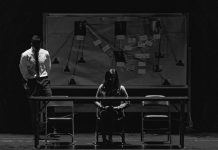Quetta: In the wake of bombing in Quetta this month that left 65 lawyers dead, authorities in the province of Balochistan are mulling sending students and young lawyers abroad for study and training to help a crippled justice system recover from the loss.
Advisor to the Chief Minister on Law, Information, & Parliamentary Affairs, Sardar Raza Muhammad Khan Barrech, told News Lens Pakistan that the government would send students and lawyers abroad for study and practice but modalities to put the plan in effect have to be decided yet.
“We still don’t have a mechanism or criteria on whom to send, when to send and to which countries because we are dealing with the immediate aftermath of the loss,” said Barrech. “However, priority will be given to the children of martyrs, followed by bright young students and lawyers.”
He said the provincial judicial system was paralyzed by the deaths of lawyers because they were busy addressing scores of legal cases in the province.
“The vacuum left by their deaths cannot be filled but the government is making efforts to make up for the loss,” he said. “Sending students and lawyers abroad is one of the plans we are considering at the moment.”
According to Director General Health Dr Masood Nausherwani, more than 70 people had been killed and 112 injured in the suicide bombing outside the civil hospital in Quetta on August 8. Most of the dead were senior lawyers and mourners who had gathered at the hospital soon after the President of the Balochistan Bar Association, Bilal Anwar Kasi, was shot by unknown gunmen.
Muhammad Wasim Akbar Dumar, a member of Balochsitan Bar Association, said according to the association’s record, 65 lawyers were killed in the bombing at the civil hospital and another 100 wounded. He said there were still a few lawyers in critical condition.
Dumar said overall there were 500 lawyers in Quetta before the blast out of which 200 were practicing lawyers.
Those killed in the blast were senior and experienced lawyers working on 75 per cent of the cases in Balochistan, according to Kamran Murtaza, a Quetta based lawyer and former president of the Supreme Court Bar Association.
“The death of lawyers has created a crisis of justice because court processes cannot proceed without relevant lawyers,” said Murtaza. “The senior lawyers had experience and could deal with the cases efficiently. Now the resolution of cases will be delayed because junior lawyers don’t have the right experience to address these.”
Murtaza said that compared to the number lawyers available in the province, the number of court cases was much higher. Already faced with a scarcity of legal professionals, the province will now have to deal with shortage of senior lawyers.
“It will severely affect the judiciary and the public access to justice,” said Murtaza. “With the number of lawyers cut brutally short, there are few left to deliver justice to people. It will have direct consequences for the human rights situation and lawlessness in the province.”
Muhammad Yusuf Kakar, a lawyer at the High Court Balochistan said with 65 lawyers killed and a hundred injured, who would take care of the cases that 165 experienced lawyers were dealing with. The bombing, he said, killed 12 Supreme Court lawyers and nearly 30 associated with the High Court in Balochistan. There were others among the dead and injured who worked with the lower courts.
“Without research, it would be hard to arrive at an exact figure of cases that the blast victims dealt with but speaking from experience, I will put the number at 600 cases,” said Kakar. “Senior lawyers like Baz Muhammad Kakar and Qaher Shah were handling 15 to 20 cases in the High Court on a daily basis.”
The death of senior lawyers has also dealt a serious blow to their leadership at the bar. “The entire leadership of lawyers has been lost,” said Kakar.
Among the dead was the former president of the Balochistan Bar Association Baz Mohammad Kakar. The blast happened at the time when the High Court Bar Association elections were just days away, scheduled for August 13.
Among the dead and injured lawyers, Baz Mohammad Kakar was the candidate for president of Professional Lawyers, Abdul Fatah was candidate for the Wukalaa Forum and Rauf Lehri for the Insaf Lawyers Forum. Baz Mohammad Kakar is dead and both Abdul Fatah and Rauf Lehri are in a critical condition. Among other candidates for important positions with different lawyer forums were Barrister Adnan Kasi, Ainudin Nasar, Abdul Ghani Mashwani and others. They were all killed in the blast.
The province only had five barristers. Among them, Barrister Amanullah Achakzai who was the head of University of Balochistan’s Law College, was shot dead by unknown assailants in June. Barrister Adnan Kasi died in the civil hospital blast. Balochistan now has only 3 barristers left.
“The vacuum cannot be filled with stopgap arrangement because it takes many years of experience and hard work to become a lawyer,” said Kakar. “We don’t have any senior lawyers and for the juniors to gain enough experience to deal with High Court and Supreme Court cases, it will take a long time.”
Since the August 8 bombing, the courts are close. Rashid Ahmed, a litigant, said he has two cases in the courts and with his lawyers dead, he has little hope for their resolution.
“I am very worried about my cases,” said Ahmad. “The dead lawyers had the experience and abilities to deal with the cases that junior lawyers do not have.”



